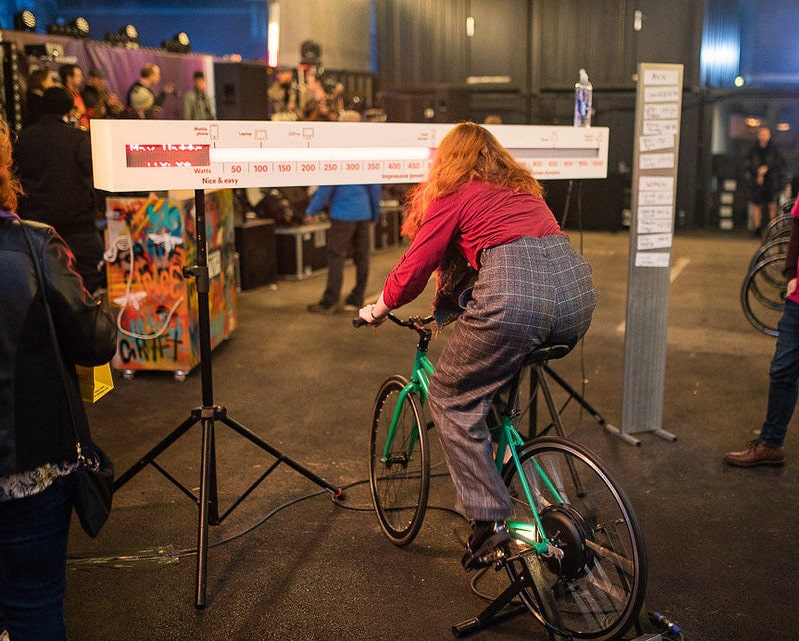HOUSES SLIDE
HOUSES SLIDE
A bicycle-powered world premiere by Laura Bowler
Southbank Centre's Royal Festival Hall, London

The piece to be performed is Houses Slide by Laura Bowler, a London Sinfonietta commission that addresses the most serious issue of our generation, the climate emergency, through the story of one woman's intimate psychological journey to figure out her response to the climate crisis, from an initial depressing realisation of the gravity of the issue, through to her refusal to be overwhelmed and decision to take positive action. With a text created by Cordelia Lynn using submissions from members of the public, this concert presentation conceived and directed by Katie Mitchell is an industry-first, and will even involve the soloist, Jessica Aszodi, performing her part from atop one of the 17 onstage bicycles.
In an effort to engage fully with the subject matter of the piece, London Sinfonietta will endeavour to measure the carbon footprint of the piece, and will here document their journey to achieve this. Read on to find out more about why we are producing this work in this way, and why the arts needs to reflect these important issues.
I remember several years ago that music commissions about climate change felt like a ‘worthy’ thing to do, but that most of society was not really focussed on it, so it seemed not to be a very important thing to do. Now, making work about the issue seems like a necessary thing to do. So when Laura proposed that she wanted to create a piece that addressed it, I was very keen to pursue it with her. And now, with writer Cordelia Lynn shaping the words and director Katie Mitchell on board bringing her vision for the staging with bike power, there is a project that we hope will - combining music, text, staging and performance - speak very powerfully about the subject.
It has become important to me that the work of the London Sinfonietta will deliberately addresses the contemporary society we are part of. Theatre and Art do this all the time, and it seems more than appropriate that a contemporary music organisation should do it too. So, from our Notes to the New Government (which were a set of newly commissioned songs directed at the incoming government after the 2015 General Election), and Phil Venables’ Gender Agenda (a game-show-concert exploring gender identity in 2018) to Tansy Davies and Nick Drake’s Cave (an opera in 2018 which was set in a future radically altered by climate change) and Matthew Herbert's more more more (about how much waste we produce made in 2018 / and re-performed in 2020) we have been keen to curate and commission projects with artists who want to communicate a very clear extra-musical message.
I know for a long time that I have found articles about climate change to be difficult to read. I have skipped over them because I could not face the harsh reality of the message. I am in denial about it, not quite believing that things have gone so far in the wrong direction and there is no evidence that enough is being done. No governments sorting it out for us, when clearly – in the face of the pandemic – they are more than able to take extreme, radical action and find solutions to existential threats, however difficult they are to manage and contemplate.
I also know that the arts themselves can’t provide the solutions or take the actions that will sort it out. And projects about climate change by a new music group may well be criticised by some (what’s the point? Just put on concerts of great music). Yet, the arts are a powerful place to be able to contemplate subjects which are hard to talk about – even to begin to face issues we are in denial about. The dialogue is between the work on stage and each individual member of the audience. It’s possible for each of us to have a private, personal and even emotional response which does not challenge us to put an opinion into words or engage in difficult debates we may not be equipped to take on. The ritual of performance allows this process to happen as it establishes a liminal space where normal life is suspended and we open ourselves up to change. If the work of art is powerful and communicates well, then there is every chance we will come out of the event somewhat different. Perhaps more motivated personally to turn new feelings, inspiration and ideas into actions that affect what we do.
From what I understand, it seems that a solution to climate change will come in part from us all, individually, changing our daily habits in spite of things carrying on as normal around us. Governments may step in eventually and cause such changes across society – but we may anyway need to work out how we are all prepared to change now. And if a piece like Laura Bowler’s Houses Slide is one small part of causing that personal change to happen, it will have been an important thing to do.
Andrew Burke
Chief Executive & Artistic Director
London Sinfonietta
Laura Bowler
Composer
Transcript:
Laura Bowler: The climate crisis is the most urgent matter for the artistic community to address right now. The more ways we find to communicate the problem, the more likely people will become active in demanding governmental action, and in turn, global action. We can all positively change our lifestyles to decrease our carbon footprint, to reduce our waste, to reduce our negative impact on the planet, but we also need to demand those in power to act with more urgency. This piece, Houses Slide, delves into the complexities at the heart of the climate crisis, climate psychology and climate grief that affect so many people. How can we change our minds, and the minds of others? How can we effect change? We're also super excited to be challenging ourselves practically, to reduce the carbon footprint of the performance through cycle power. Our incredible soprano Jessica Aszodi has agreed to the challenge of cycling while singing throughout the performance, as her character journeys through the different stages of climate awareness. We're also going to be trying to keep track of our carbon footprint as we create this work, measuring our Zoom meetings, the time that I spend sat at my computer composing the work, people travelling to the performance, lots of different aspects, just kind of really acknowledging the footprint that creating a work like this takes. Obviously I'm hugely grateful to London Sinfonietta for commissioning this work that I feel is incredibly important, but also to the Southbank Centre for going on this journey with us to create this performance using renewable energy through bike power.
Along with all other organisations that receive regular funding from Arts Council England, the London Sinfonietta has been measuring aspects of its carbon impact since 2012. As an organisation that performs in different venues across each season and does not have its own building, there are a number of challenges when it comes to approaching this on a project-by-project basis and, to date, we have not been able to set a benchmark for the average carbon footprint of a London Sinfonietta production (which might typically be a newly commissioned work that is produced by the LS team and receives a single performance).
However, the subject matter of Houses Slide and the enthusiasm of the artists involved, particularly composer Laura Bowler and director Katie Mitchell, encouraged us to take up the challenge and approach it as a case study for measuring the carbon impact of an entire project, from the moment when the composer first puts pencil to paper, up until we are home, happy and tired after seeing the piece in live performance.
In early May 2021, we decided to look into how/if we can measure the carbon footprint of Houses Slide, not just of the event itself but taking into account the whole project from as early in the creative development period as possible. We were aware of the Creative Green Tools on the Julie's Bicycle website (from using them to upload data around our office operations), but we hadn’t used them in relation to projects and events. As London Sinfonietta's Green Champion, I took on the task of investigating.
I decided the best starting point was to set up a large spreadsheet where all the data related to the carbon impact of the project could be collected. Once complete it could be fed into various carbon calculators (including the Creative Green Tools) to give us an overall total carbon figure. The spreadsheet covers carbon from lighting and audio at rehearsal and performance venues, creative team and production staff travel, player travel, audience travel, Zoom meetings… However, it immediately started to raise questions in my mind. When do we start counting from? Do we try and work out energy usage for the artists during the creation of the piece when they were working from home? Do we try and count every single email we’ve sent and estimate the carbon impact from them all? Will the venues be able to share relevant energy data with us? Where does our carbon footprint end and the venue’s begin? What about the carbon from online advertising or social media posts for the event?
In terms of reducing the carbon footprint of the project (as well as measuring it), Katie and Laura proposed a while ago that we should use pedal power to provide energy for the rehearsals and concert. It was not initially clear whether this would be feasible and the production team needed the advice and expertise of Colin Tonks and Caro Russell of Electric Pedals to check that it was a practical solution. How many cyclists would we need to ensure that the lights don’t go out half way through the performance? By mid-May, the news was good. It should be possible and it’s thought that 16 cyclists should give us sufficient power to stage the piece. They also plan to use the bikes to pre-charge the cameras used to capture the event. This is exciting as it means that all the on-stage lighting (they think they can pretty much manage with stand lights only) and audio can be pedal-powered for the rehearsals and the performance. We just need to find some willing, volunteer cyclists now.
This is a step forward for us as an organisation and it’s something that is important to me personally. I worry deeply about climate change and what kind of world my daughter might inherit to live in so I’m pleased that the London Sinfonietta is taking on this challenge which will hopefully enable us to learn more about our carbon footprint and help to move the conversation along, in our small corner of the arts sector at least.
Elizabeth Davies
Head of Finance
London Sinfonietta

We are looking for fit and healthy volunteers to provide power for this concert by cycling specially-adapted bikes.
The pedalling demand on each individual cyclist is, whilst constant, relatively light work, but in order to take part, you'll need to be able to pedal for 90 minutes at a time. Unfortunately due to insurance reasons, we cannot accept any cyclists under the age of 18.
If you'd like to be involved, please register your interest
Register your interest





Published: 23 Jun 2021